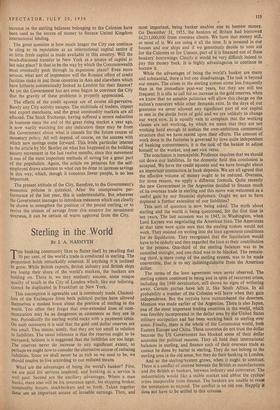Sterling in the World
THE banking community likes to flatter itself by recalling that 50 per cent, of the world's trade is conducted in sterling. The proportion holds remarkably constant. If anything it is inclined to grow. While British exports, British industry and British ships are losing their share of the world's markets, the bankers are holding on. There is, we may modestly assume, some unique quality of touch in the City of London which, like our tailoring, cannot be duplicated in Frankfurt or New York.
This assumption is agreeable and is commonly made. Chancel- lors of the Exchequer from both political parties have allowed themselves a modest boast about the position of sterling in the world. Too often they forget that over-extended lines of com- munication may be as dangerous in commerce as they are in war. Periodically the sterling world rocks with a payments crisis. On such occasions it is said that the gold and dollar reserves are too small. This means, surely, that they are too small in relation to liabilities. The usual inference is that the reserves ought to be increased, Seldom is it suggested that the liabilities are too large. The reserves never do increase to any significant extent, so Perhaps we ought now to consider the alternative course of reducing liabilities. Since we shall never be as rich as we used to be, we should resolve to live according to our reduced means.
What are the advantages of being the world's banker? First, we are paid for services rendered, and banking as a service is well paid. Second are the ancillary advantages. Where a man banks, there also will be his insurance agent, his shipping broker, commodity buyers, stockbrokers and so forth. Taken together these are an important source of invisible earnings. Then, and most important, being banker enables one to borrow money. On December 31, 1955, the bankers of Britain had borrowed 14,211,000,000 from overseas clients. We have that money still,' or most of it. We are using it all the time. It is invested in our houses and our ships and if we generously decide to vote aid for the Colonies or for Unesco, part of it is financed out of these bankers' borrowings. Clearly it would be very difficult indeed to pay this money back. It is highly advantageous to continue to borrow it. •
While the advantages of being the world's banker are many and substantial, there is but one disadvantage. The task is beyond our means. The crises in the sterling system come less frequently than in the immediate post-war years, but they are still too frequent. It is idle to call for an increase in the gold reserves, when we know that no sensible politician will allow this charge on the nation's resources while other demands exist. In the days of our greatness we never allowed any significant part of our capital to rest in the sterile form of gold and we are unlikely to change our ways now. It is equally vain to complain that the working classes are not working, by which we mean that they are not working hard enough to sustain the over-ambitious commercial structure that we have reared upon their efforts. The amount of work done in the factories is governed by laws quite independent of banking commitments; it is the task of the banker to adjust himself to the worker, and not vice versa.
The conclusion is inescapable. Prudence requires that we should cut down our liabilities. In the domestic field this conclusion is accepted. We have the credit squeeze and we have brought about an important contraction in bank deposits. We are all agreed that the effective volume of money ought to be reduced. Overseas, for some reason, we apply a different formula. Quite recently the new Government in the Argentine decided to finance much of its overseas trade in sterling and this move was welcomed as a useful gain by our financial diplomats. Ought we not to have deplored a further extension of our liabilities?
This sort of question is now being asked. The myth about sterling and the world is being questioned, for the first time in ten years. The last occasion was in 1945, in Washington, when Lord Keynes was negotiating the American loan. The Americans at that time were quite sure that the sterling system would not work. They insisted on writing into the loan agreement conditions for its liquidation. They recognised that the liquidation would have to be orderly and they regarded the loan as their contribution to the process. One-third of the sterling balances was to be cancelled outright, and one-third was to be blocked. The remain- ing third, a mere rump of the sterling system, was to be made convertible, that is to say indistinguishable from the American dollar.
The terms of the loan agreement were never observed. The sterling system continued in being and in spite of recurrent crises, including the 1949 devaluation, still shows no signs of withering away. Certain parties have left it, like South Africa. In all probability a number of the Colonies will leave when they gain independence. But the recruits have outnumbered the deserters. Mention was made earlier of the Argentine. There is also Japan, one of the most important trading countries in the world, which was forcibly incorporated in the dollar area by the United States military occupation and has been working back to sterling ever since. Finally, there is the whole of the Communist world, both Eastern Europe and China. These countries do not trust the dollar because the US Government has blocked some of their dollar accounts for political reasons. They all hold their international balances in sterling, and finance such of their overseas trade as cannot be done by barter in sterling. They do not belong to the sterling area in the old sense, but they do their banking in London.


















































 Previous page
Previous page